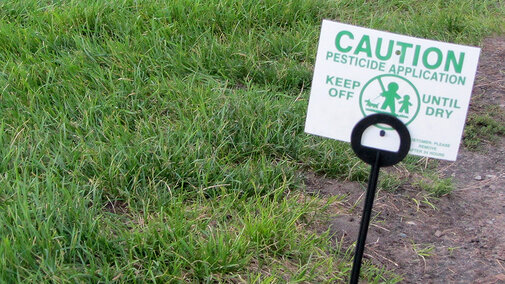According to estimates, Nebraska Extension will train nearly 10,000 private, commercial and noncommercial pesticide applicators on safety in 2022. Nebraska Extension provides pesticide safety training via traditional, in-person classes as well as online course options. This training allows a person to become certified or recertified to hold a state pesticide license.
The vast majority of pesticides on the market are classified as “general-use pesticides” (GUP), meaning they are available to the general public. The Environmental Protection Agency (EPA) classifies certain pesticide products as “restricted-use pesticides” (RUP) if they pose an increased risk to human health or the environment. To purchase and use RUPs, one must possess a pesticide applicator license issued by the state in which they will be applying the products. These licenses are classified as either private, commercial or noncommercial.
Private applicators can certify or recertify by either (1) attending a private pesticide safety training session, (2) completing the online private pesticide safety program, or (3) passing a private applicator exam administered by the Nebraska Department of Agriculture (NDA). Additionally, private licenses can be recertified by attending a Crop Production Clinic.
New commercial/noncommercial applicators must pass a General Standards exam (covering information relevant to all applicators) and at least one category-specific exam. Exams are offered at initial training sessions, testing-only sessions and through the Pearson VUE computerized testing service.
Prepare for applicator exams in one of two ways:
- Purchase study manuals for each category needed and attend an initial training session (exam opportunities included).
- Purchase study manuals for each category needed and take your exams at a testing-only session.
- Purchase comprehensive, digital study materials (i.e., FlipBooks) for each category needed. If you purchase FlipBooks, you do not need to also attend a training session. However, you will still need to arrange to take your exams. Nebraska’s Pesticide Safety Education Program (PSEP) Office recommends this option — FlipBooks combine study manuals with the videos shown at initial training sessions into one digital product, saving you money.
Commercial/noncommercial applicators can recertify by either (1) attending an in-person recertification training session, (2) completing online commercial/noncommercial recertification training, or (3) attending an approved conference. Approved conferences include Crop Production Clinics (recertify in the Agricultural Pest Control-Plant category), the Nebraska Turf Conference (recertify in the Ornamental and Turf category), the Nebraska Urban Pest Management Conference (recertify in the Structural/Health and Wood Destroying Organisms categories), and the Nebraska Aviation Trades Association Convention (recertify in the Aerial Pest Control category).
Once an applicator has been certified (or recertified), the NDA will mail them a postcard requesting payment of their licensing fee. The private license fee is $25; the commercial license fee is $90; there is no fee for a noncommercial license. Once the fee is paid, the NDA issues the license. The licensing fee is separate from the cost of training. Private pesticide safety training is $50; commercial/noncommercial pesticide safety training is $80.
Important Changes in 2022
Both new and recertifying applicators need to be aware of changes to Nebraska’s pesticide certification/licensing program, effective beginning in 2022.
- The minimum age for certified applicators is now 18.
- New and recertifying applicators must present government-issued identification (e.g., a driver’s license) at training.
- The appearance of both private and commercial/noncommercial applicator licenses will be updated. Private licenses will now be a tan color and will be printed with “General Agriculture” and “00” on them to denote “standard” private certification. Commercial/noncommercial licenses will now be a blue color.
- Private applicators who wish to use RUP fumigants will need “standard” private applicator certification AND a fumigation certification. To use soil fumigants, an applicator must pass NDA’s Soil Fumigation exam; if this certification is obtained, it will appear on the license as “01A.” To use fumigants for grain bins or rodent burrows, an applicator must pass NDA’s Non-Soil and Structural Fumigation exam; if this certification is obtained, it will appear on the license as “11.” Private applicators will prepare for, and take, these exams in the same way as a commercial/noncommercial applicator (see above).
- Private applicators who wish to apply RUPs aerially will need to acquire a commercial/noncommercial applicator license with the Aerial Pest Control endorsement.
These changes will be phased in over the next three years as applicators come up for recertification. For example, a private applicator whose license expires in 2023 can continue applying fumigants without a fumigation endorsement until they recertify in 2023.
Not Sure Where to Start?
New for 2022, the PSEP Office has created an online tool intended to help prospective applicators determine if they need a license, which type of license they need and how they can go about acquiring their license.
Additional Pesticide-related Training
Chemigation is the practice of applying agrichemicals (including pesticides) to cropland through an irrigation system. In Nebraska, this practice requires training and certification every four years. Initial and recertifying chemigators can train and test online.
XtendiMax®, Engenia®, and Tavium® are RUPs containing dicamba that can only be used on dicamba-tolerant soybean and cotton crops. In addition to requiring a pesticide applicator license, you must also take yearly dicamba-specific training before purchasing or applying any of these three herbicides. The products’ registrants (Bayer, BASF and Syngenta, respectively) will provide dicamba-specific training in 2022. For more information on RUP dicamba, please visit the NDA’s website.
Paraquat is an herbicide that is acutely toxic to humans; all products containing paraquat are RUPs. In addition to requiring a pesticide applicator license, you must take paraquat-specific training (every three years) to purchase or apply paraquat products. The paraquat training is available for free on the Extension Foundation Online Campus, and can be completed any time.

